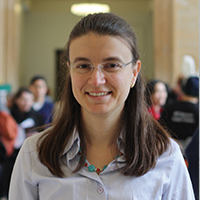 Electrochemistry is the magic that binds together the many fields that excite Professor Bilge Yildiz, ECS Awarded Life Member and recipient of the 2012 ECS Charles W. Tobias Young Investigator Award—and invited speaker in the 241st ECS Meeting Symposium I05: Mechano-Electro-Chemical Coupling in Energy Related Materials and Devices 4. Prof. Yildiz was named a 2021 Fellow of the American Physical Society for “innovative contributions to understanding and manipulating ionic defects and charge transport at electro-chemo-mechanically coupled oxide interfaces and devices.”
Electrochemistry is the magic that binds together the many fields that excite Professor Bilge Yildiz, ECS Awarded Life Member and recipient of the 2012 ECS Charles W. Tobias Young Investigator Award—and invited speaker in the 241st ECS Meeting Symposium I05: Mechano-Electro-Chemical Coupling in Energy Related Materials and Devices 4. Prof. Yildiz was named a 2021 Fellow of the American Physical Society for “innovative contributions to understanding and manipulating ionic defects and charge transport at electro-chemo-mechanically coupled oxide interfaces and devices.”
Wide-ranging interests and training
An MIT News article describes Yildiz’s wide-ranging interests and training as “Electrochemistry, From Batteries to Brains.” From an MIT PhD in nuclear engineering, studying artificial intelligence for the safe operation of nuclear power plants; she moved on to an MIT postdoc between the nuclear engineering and mechanical engineering departments, studying electrochemistry in fuel cells; followed by a stint at the Argonne National Laboratory using synchrotron X-rays to investigate materials’ structure and chemistry; and returned to MIT in 2007 and research leading to the prediction of better material surfaces to increase the efficiency and durability of fuel cells and batteries. Dr. Yildiz is the MIT Breene M. Kerr Professor in the Department of Nuclear Science and Engineering (NSE) and the Department of Materials Science and Engineering. She leads the Laboratory for Electrochemical Surfaces which focuses on the electrochemistry of ionic-electronic oxides and their interfaces—in fuel cells, electrolyzers, batteries, corrosion, and computers that mimic the way the brain processes information in learning.
Computers and the brain
As part of the MIT Quest for Intelligence, Prof. Yildiz collaborates with professors from the Department of Electrical Engineering and Computer Science, and Department of Brain and Cognitive Sciences, to answer the questions: how does human intelligence work, in engineering terms; and how can we use our understanding of human intelligence to build smarter machines for the benefit of society? Prof. Yildiz thinks the answers lies in electrochemistry.
Don’t miss Prof. Yildiz at the 241st ECS Meeting—and bring your wide-ranging research to the world by submitting an abstract by the extended deadline of December 17, 2021!

